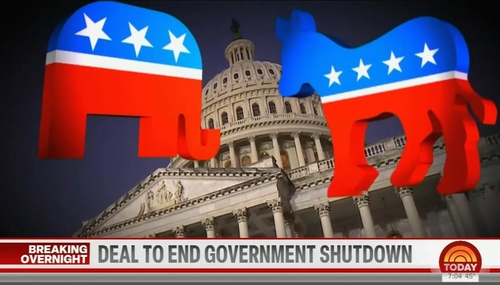
What Shawn Tully's column at CNNMoney.com did on July 24 to expose the truth about what ObamaCare does to the coverage of those who have employer-provided health insurance (discussed yesterday at NewsBusters; at BizzyBlog), the Washington Post's Charles Lane did on August 8 ("Undue Influence; The House Bill Skews End-of-Life Counsel") to the myth that ObamaCare won't have serious negative consequences for patients who begin to have serious, potentially life-ending health issues.
Mr. Lane has clearly read the bill, clearly doesn't like what he sees, and calls it out in specific detail.
He starts out slowly by creating the straw-man argument that those "on the far right" see ObamaCare "as a plan to force everyone over 65 to sign his or her own death warrant. That's rubbish."
Of course it is, but so is the claim that opponents on the right or left are saying that. Even Sarah Palin's Facebook post never mentions "euthanasia," and Ann Althouse correctly characterizes Pailn's reference to "death panels" as "a good and fair polemical expression if in fact life-saving care will be rationed on this basis (of what Palin described as “level of productivity in society")."
There is plenty of reason to believe it will be, as Lane explains (bolds are mine):
..... I was not reassured to read in an Aug. 1 Post article that "Democratic strategists" are "hesitant to give extra attention to the issue by refuting the inaccuracies, but they worry that it will further agitate already-skeptical seniors."
If Section 1233 is innocuous, why would "strategists" want to tip-toe around the subject?
Perhaps because, at least as I read it, Section 1233 is not totally innocuous.
Until now, federal law has encouraged end-of-life planning -- gently. In 1990, Congress required health-care institutions (not individual doctors) to give new patients written notice of their rights to make living wills, advance directives and the like -- but also required them to treat patients regardless of whether they have such documents.
..... Section 1233, however, addresses compassionate goals in disconcerting proximity to fiscal ones. Supporters protest that they're just trying to facilitate choice -- even if patients opt for expensive life-prolonging care. I think they protest too much: If it's all about obviating suffering, emotional or physical, what's it doing in a measure to "bend the curve" on health-care costs?
Though not mandatory, as some on the right have claimed, the consultations envisioned in Section 1233 aren't quite "purely voluntary," as Rep. Sander M. Levin (D-Mich.) asserts. To me, "purely voluntary" means "not unless the patient requests one." Section 1233, however, lets doctors initiate the chat and gives them an incentive -- money -- to do so. Indeed, that's an incentive to insist.
Patients may refuse without penalty, but many will bow to white-coated authority. Once they're in the meeting, the bill does permit "formulation" of a plug-pulling order right then and there. So when Rep. Earl Blumenauer (D-Ore.) denies that Section 1233 would "place senior citizens in situations where they feel pressured to sign end-of-life directives that they would not otherwise sign," I don't think he's being realistic.
What's more, Section 1233 dictates, at some length, the content of the consultation. The doctor "shall" discuss "advanced care planning, including key questions and considerations, important steps, and suggested people to talk to"; "an explanation of . . . living wills and durable powers of attorney, and their uses" (even though these are legal, not medical, instruments); and "a list of national and State-specific resources to assist consumers and their families." The doctor "shall" explain that Medicare pays for hospice care (hint, hint).
..... Section 1233 goes beyond facilitating doctor input to preferring it. Indeed, the measure would have an interested party -- the government -- recruit doctors to sell the elderly on living wills, hospice care and their associated providers, professions and organizations. You don't have to be a right-wing wacko to question that approach.
Lane gets close to another key point, but doesn't quite get there. It's reasonable to believe that the medical profession would in short order determine that performing end of life consultations is the conscientious thing to do. Conversely, not doing them under ObamaCare would likely be seen as problematic in medical quality control and peer reviews, as well as in matters relating to professional advancement.
Nonetheless, the nuking (based on specific language in the plan itself) by an editorialist at a clearly left-leaning outfit of the claim that ObamaCare's end of life consultations are mere angelic, pressure-free additions to a pure patient-driven plan should be seen as a significant milestone in discrediting the whole unwieldy contraption -- which is more than likely why Lane's contrarian editorial has gained relatively little establishment media.
When you combine Lane's a clear understanding of how the counseling "feature" would incentivize denial of care with the frightening utilitarianism of many of the President's closest advisers and the clear evidence that the President himself has succumbed to a great extent to the utilitarian non-ethic, you realize that not only is there is no moral alternative to opposing ObamaCare as it currently stands, but that there is no way to make it acceptable as long as those who are in charge remain in charge.
Perhaps if more beat reporters would actually read the bill and investigate some of the ghoulish beliefs of many of those who are closest to the President, we wouldn't have to wait for people like Tully at Fortune and Lane at the Post to do it for them. In the old newspapers days, getting scooped by someone on the opinion side would be seen as a humiliation to those in the trenches. Alas, it appears that their capacity for embarrassment has diminished to near nothingness.
Cross-posted at BizzyBlog.com.




